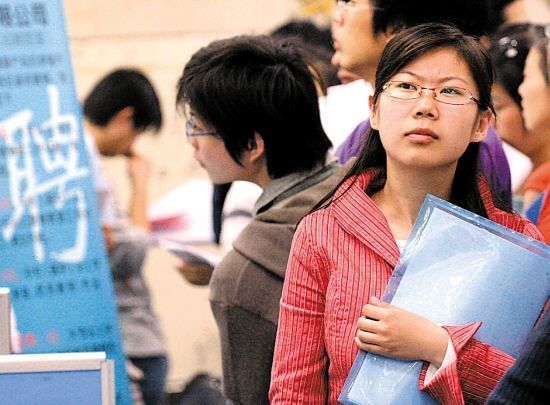Graduates face tough competition for low-paying jobs
 0 Comment(s)
0 Comment(s) Print
Print E-mail
Xinhua, December 8, 2011
E-mail
Xinhua, December 8, 2011
|
|
|
A survey conducted in 2010 by the Chinese Academy of Social Sciences (CASS) said 89.6 percent of graduates had found employment within six months of graduation, a 3-percent increase compared with that of 2009. [File photo] |
Yang Qiongming, one of millions of recent graduates who have just joined the job-hunting herd, has not been impressed by the offers she's fielded.
"The starting salary for my first job will hardly be higher than what migrant workers get," the 21-year-old woman said after a hectic day dashing around job fairs.
Yang's father, a construction worker in Shanghai, made about 200 yuan (31.30 U.S. dollars) daily.
A graduate of a four-year course at Hefei College in Anhui province, Yang originally expected a job with a monthly salary over 3,000 yuan -- but that was before she started looking, and reality set in.
Since late September, Yang, along with another 6.8 million college graduates, has gone from hitting the books to hitting the streets in search of a job, at a time of dismal global economics.
Once known as the "world's factory," it's uncertain whether China's job market can absorb so many graduates.
A survey conducted in 2010 by the Chinese Academy of Social Sciences (CASS) said 89.6 percent of graduates had found employment within six months of graduation, a 3-percent increase compared with that of 2009.
Yet for recent graduates struggling to find a decent-paying job, that 3-percent hop means little. Statistics indicate that two million graduates who never got jobs last year are competing for jobs with this year's crop, Yang and her fellow graduates.
As a result of the heated competition, the average monthly salary for graduates was just under 2,500 yuan in 2010, according to the CASS study.
"It's become much more difficult to find a good job," said Zhu Yuxi, an art major. "We must confront the harsh reality boldly and learn to build up from nothing."
Zhu took part-time jobs as a courier and construction worker when he was still a student, and he said he won't refuse a job with a low starting wage.
Today's education expansion, which began with a dramatic swell of people going to university in 1999, has been criticized for saturating the job market and creating job-seeking anxiety, said Wang Kaiyu, a researcher with Anhui Provincial Academy of Social Sciences.
Wang said graduates should ignore lower salaries and accept that their long-term competitiveness is dependent on the training and experience they get and how fast they can learn and adapt.
"Finding a job is not a problem," said Zhao Juan, a student from the Anhui Agriculture University. "The problem is my first one or two months' salary can't even pay for one iPad."
Amid the bleak job market, Zhao has her own philosophy.
"Your job is a trivial part of life -- you should live for yourself," she said. And with that, she's turned her back on the current chaos of the job hunt and decided to head to graduate school.







Go to Forum >>0 Comment(s)